
Radzyń Podlaskipronounced [ˈrad͡zɨɲ pɔdˈlaskʲi] is a town in eastern Poland, about 60 km north of Lublin, with 15,808 inhabitants (2017). Situated in the Lublin Voivodeship since 1999, previously it was part of the Biała Podlaska Voivodeship (1975–1998). It is the capital of Radzyń Podlaski County, and historically belongs to the region of Lesser Poland. The town was founded in 1468, and its most important landmark is the rococo Potocki Palace.
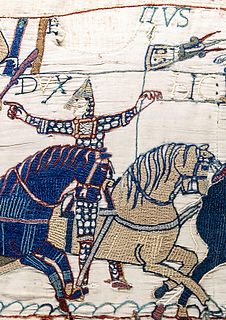
Eustace, also rendered Eustis, is the rendition in English of two phonetically similar Greek given names:

Stanisław Michał Ernest Denhoff was a Polish–Lithuanian Commonwealth aristocrat, Grand Master of the Hunt of Lithuania, Grand Chorąży of the Crown (1704–1721), voivode of Połock (1721–1728), politician and a military commander.
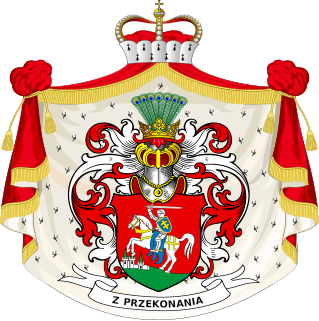
The House of Sanguszko is a Polish and Lithuanian noble and aristocratic family of Lithuanian and Ruthenian origin, connected to the Gediminid dynasty. Like other princely houses of Polish–Lithuanian Commonwealth, its origins are considered murky. Present historical opinion holds in favour of their descent from Algirdas' grandson Alexander, lord of Kovel and Liuboml, whose name can be shortened to Sangush. The family supposedly descends from two lines, associated with two of his sons, Alexander and Michael.
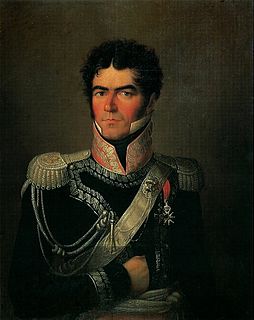
Prince Eustachy Erazm Sanguszko (1768–1844) was a Polish nobleman, general, military commander, diplomat and politician.
Eustachy Sanguszko may refer to:

The House of Sapieha is a Polish-Lithuanian noble and magnate family of Lithuanian and Ruthenian origin, descending from the medieval boyars of Smolensk and Polotsk. The family acquired great influence and wealth in the Polish–Lithuanian Commonwealth during the 16th century.

Princess Maria Klementyna Sanguszko was a Polish noblewoman, heiress, and the wife of politician Alfred Józef Potocki.

Prince Władysław Hieronim Sanguszko (1803–1870) was a Polish nobleman, landowner, conservative politician.
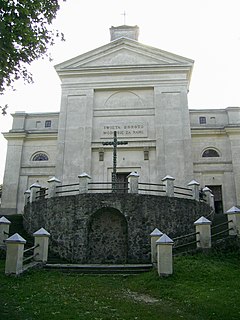
Slavuta is a city in Shepetivka Raion, Khmelnytskyi Oblast (province) of western Ukraine, located on the Horyn River. The city is located approximately 80 km from the oblast capital, Khmelnytskyi, at around 50°18′N26°52′E. Slavuta hosts the administration of Slavuta urban hromada, one of the hromadas of Ukraine. Population: 35,068
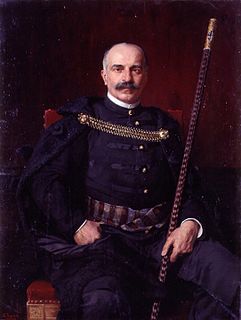
Prince Eustachy Stanisław Sanguszko was a Polish noble (szlachcic), conservative politician.
Szymon is a Polish version of the masculine given name Simon.
Krzysztof is a Polish given name, equivalent to English Christopher. The name became popular in the 15th century. Its diminutive forms include Krzyś, Krzysiek, and Krzysio; augmentative – Krzychu

Stanisław Mokronowski (1761-1821) was a prominent member of the Polish landed gentry of Bogoria coat of arms. A general of the Polish Army and a royal Chamberlain, Mokronowski took part in both the Polish–Russian War of 1792 and Kościuszko's Uprising of 1794.
Plater is a surname, and may refer to:

The House of Tyszkiewicz was a wealthy and influential Polish-Lithuanian magnate family of Ruthenian origin, with roots traced to the times of the Grand Duchy of Lithuania. They held the Polish coat of arms Leliwa. Their nobility was reaffirmed in Polish–Lithuanian Commonwealth and the Russian Empire.
Janusz is a masculine Polish given name. It is also the shortened form of January and Januarius.

Tyszkiewicz is the name of the Tyszkiewicz family, a Polish–Lithuanian magnate noble family of Ruthenian origin. The Lithuanian equivalent is Tiškevičius; it is frequently transliterated from Russian and Belarusian as Tyshkevich.
Hieronim is the Polish form of Hieronymus and may refer to:
Michał Wielhorski (1755–1805) was a Polish-Lithuanian count. In 1789, he was a brigadier of the Polish Crown Army. In 1792, he was made a lieutenant general of that army and he fought in the War of 1792. During the Kościuszko Uprising, he was a lieutenant general of the Grand Ducal Lithuanian army.
This page is based on this
Wikipedia article Text is available under the
CC BY-SA 4.0 license; additional terms may apply.
Images, videos and audio are available under their respective licenses.












